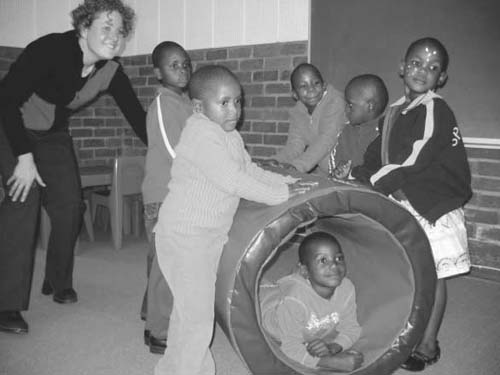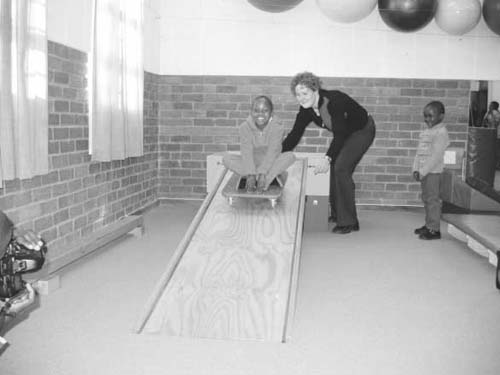Japan's Official Development Assistance White Paper 2006
Column II-2 Republic of South Africa: Provision of Educational Material for the Dominican School for the Deaf Children
For assistance in developing countries, it is necessary to consider the situation of socially weak people, as well as domestic disparities between the rich and poor, and regional disparities. Japan identifies the "assurance of fairness" as a basic policy in the ODA Charter. Based on this thought, Japan provides support for capacity development in the education sector. For example, in 2005, Japan provided support to the Dominican School for Deaf Children in the Republic of South Africa (hereinafter: "South Africa") through its grant assistance for grass-roots human security projects. This public school for the deaf was established in 1962 in the northern suburb of South Africa's capital Pretoria, on the northernmost edge of Gauteng Province. This school was the only deaf children school for black children in the Gauteng Province during the apartheid era. Since then, throughout the post-apartheid era, the school has been consistently accepting many children from low-income families living in the former black township.
There are currently about 2.25 million physically disabled people1 in South Africa, about 310,000 of whom are considered to have hearing disabilities. Among 66% of them have poor literacy skills2 and 70% of them are unemployed. Deaf people are doubly burdened with physical and economical handicaps. It is an important issue to support the deaf to attain social self-reliance and quality of life through education and vocational training.
In tackling this issue, the Dominican School for the Deaf Children aims to increase the literacy abilities of children which are necessary for social life. The school program is designed to provide sign language education in the formal primary school curriculum as much as possible. The school also put efforts into the future-oriented vocational training based on each stage of physical development of children.
This school provides on occupational therapy, which is effective for developing physical abilities of the deaf children. This therapy is a medical treatment activities using balls, mats, ropes and other equipment to improve the physical functions of children, which are affected by hearing disabilities. However, the Dominican School for the Deaf Children used to work on this therapy without such educational equipment, and thus it was impracticable for the therapists to perform suitable therapy programs in accordance with each physical development stage of the deaf children.
To cope with this situation, Japan provided funds of ¥1.4 million to purchase this educational equipment for occupational therapy, through grant assistance for grass-roots human security projects. This project enabled the therapists to achieve and maintain appropriate therapy that is effective for the deaf children.
The local newspaper Pretoria News also wrote up this support in an article. The article quoted school therapist Ms.Cunning as saying "The children are overjoyed at the Japanese aid. Even if it is a small help, for hearing disabled children it will surely make a big change in each life."


Children using specialized equipment donated


 Next Page
Next Page